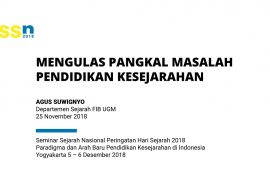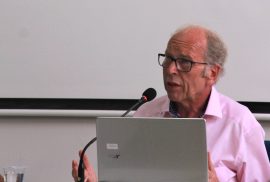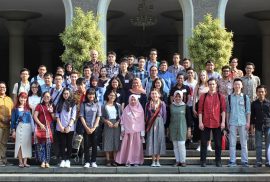After 1998, the writing of history in Indonesia developed rapidly with new sources and methods. This is not directly proportional to the teaching of history in the classroom which remains monotonous. The absence of historiography and history writing problems as well as the ability of teachers to teach have contributed to the undeveloped teaching of history in schools. Historical writing always contains methodological limitations and is interesting to discuss. If this is presented in teaching in schools, both teachers and students will be able to discuss and criticize history and historical writing. In reality, teaching history in schools only presents the substance of historical events as written in the text. This method makes activities in the classroom very passive, because students only repeat readings from books without discussing historiographical problems and methodological problems. One way that can be done to create a critical attitude among students about methodology and historiography is by presenting various writings that discuss the same theme. This shows that historical writings can be written from various perspectives. In improving the competence of teachers, we cannot be separated from the educational background they received before becoming educators. Each teacher was educated at a different time. To improve the quality of teachers, improvements must be made to the teacher education process. “Scientists who are Masters” or “Ilmuwan yang Guru” are needed to accomplish this. One must be qualified as a scientist in his field before being prepared to become a teacher. They must not only master the substance of the field of science, but also the methodological process and axiological problems of the science. If this is already owned, then he will be ready to become a teacher. In the field of history, for example, prospective teachers must have an understanding of historical philosophy and historical methodology.
2018
Hans Visser’s book, Wieteke van Dort: Kind van Twee Culturen; Een familiekroniek was published on October 25, 2018. However, as a journalist working with Noor d-Holland Dagblad, it seems that Hans is quite interested in telling the story to the public.
On Thursday, November 2 2018, the UGM History Department invited Hans to tell the story of Wieteke van Dort’s life. The event was held from 1 to 15.00 in Meeting Room 1, Poerbatjaraka Building, FIB, UGM.
According to Hans, what is interesting about Wieteke is the origins of the two cultures that have influenced him, Java and the Netherlands. Yes, all because Wieteke is indeed an Indo. Born in Surabaya on May 16, 1943, Wieteke is the daughter of a Dutch father and Javanese mother. Unfortunately, when he was visiting the Netherlands at the age of 18, his family decided to settle in Den Haag
As citizens of modern Southeast Asia, we often take for granted nation-state that in fact is a new concept. Not only it is contemporary, border that demarcate states both on water and land is innately artificial and porous. Department of History, Faculty of Cultural Sciences UGM initiated “International Summer School on Southeast Asian Studies; Transnational History: Becoming a Cosmopolitan Historian” to promote perspective that transcends border for young and potential researchers. The summer school took place at Faculty of Cultural Sciences Universitas Gadjah Mada from 27th August– 6th September 2018. Participants of this summer school are undergraduate and graduate students as well as young lecturers from Australia, Japan, Malaysia, Thailand, United States, and Vietnam. This summer school also incorporates Indonesian students from state universities throughout the country.
Organized by History Department, Faculty of Cultural Sciences and Faculty of Social and Political Sciences, Universitas Gadjah Mada
Transnational history has produced a significant body of work since its development in the late 1980s and early 1990s. This approach owed its inception as part from the shift from political history that was comfortably located within the national narrative toward social and cultural history in the 1970s and 1980s that developed perspectives such as race, ethnicity, class, and gender that was localized and non-national. These developments, unfortunately, had worried historians because of the parochial and antiquarian nature of local histories. The early 1990s and 2000s saw the publication of David Thelen’s Toward the Internationalization of American History and Thomas Bender’s Rethinking American History in Global Age from which efforts to provincialize and denationalize American history has pointed the way for a true dialogue of experts from all parts of the world in imagining differential spaces other than that of the nation-state. This is needed in order to construct an American historiography that could meet the current needs of a globalizing world and place it with emphasis on a perspective of the future. Instead of focusing on local phenomenon, the emphasis was on understanding social, cultural and political ones as a transnational process; reconceptualizing identities, communities, and products within different transnational framework; for instance, Hollywood movies as it was received and recreated on other parts of the globe and thus seeing it not merely as an American cultural product, but a wider globalizing phenomenon. Bruce Mazlish and Ralph Buultjen’s edited volume Conceptualizing Global History expands this further by bringing forth ideas in developing global narratives of local or non-national identities and spaces. Two approaches that were identified by Thelen has been to focus on either borderlands, as liminal spaces in which national units undergo transformative shifts, and the comparative approach, not merely as a means for national historians to compare each other’s narratives but to create new perspective altogether that is both national and international.




